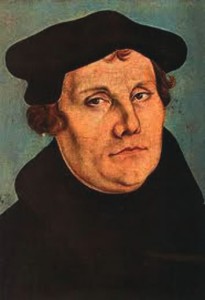Luther’s Example Instructive?
Martin Luther, the German Augustinian monk who rebelled against Rome and sparked the European Reformation is best known for his famous 95 theses which he may or may not have nailed on the door of the Wittenberg Cathedral. He is less known for his brilliantly successful translation of the Bible into German which became the bestseller of the 16th century and had an enduring influence on the German language.
Luther’s belief in salvation by faith alone lead him to violate the long-standing prohibition on translating the Bible into vernacular languages. He was not above translating crucial Pauline texts to support his view of salvation, and he famously said that the Greek text of Erasmus did not contain ‘by faith alone’ but the German idiom and Paul’s intention demanded it. Such controversies are things of the past now due to the work of the Catholic-Lutheran Dialogue, especially the Joint Declaration on Justification 1993,which revealed large areas of consensus.
The German dialect that Luther used for his translation was no-one’s native tongue at the time. It was hundreds of years before there was a single German state. Instead he borrowed an emerging standard used by the Holy Roman Empire, “chancellory German” as a base with some currency in different regions.
Luther’s inspiration was to enliven his translation with words he heard on the street in his bit of Saxony. He pestered his friends and other scholars as to which dialectical words would be most widely understood. The result was so successful that a Catholic opponent complained that “even tailors and shoemakers…read it with great eagerness.” Luther’s version is still the most popular German translation, and is so universal that it threatens Germany’s other dialects with death by standardisation.
Achieving a similar result with an English translation is problematic to say the least. English is spoken across several continents by a sizeable portions of the world’s population. Monsignor Ronald Knox produced a one-man English version in the 1950s, after ‘ten years solid’ labour. It was popular for a while, but on his advice was never revised: ‘when its time is done, throw it out’ he was reported to have said. The Jerusalem Bible was translated direct from Biblical languages, and from French into English. The church in USA did not like it, and its use of ‘Yahweh’ was offensive to Jewish readers. It has been revised but is anathema to the CDW (Sacred Congregation for Worship) in Rome because of its attempt at inclusive language.
To render an English translation so lively that it would be eagerly read by all?
Could what Luther achieved be done by a translator into English? To render a translation so lively that it would be eagerly read by all? A translation so accurate and timeless that it would be impervious to changes in the language, and become some kind of a standard, like the King James or Douai-Rheims versions were for English speakers.
Luther had the vision and generosity of spirit to want to share the Good News with the ordinary people. He enlivened the word of God rather than enshrining it. The Roman Catholic Church has plenty of gifted linguists and scholars who could produce a definitive English translation if encouraged. Surely that is something for which we could all hope and pray.


 Entries(RSS)
Entries(RSS)